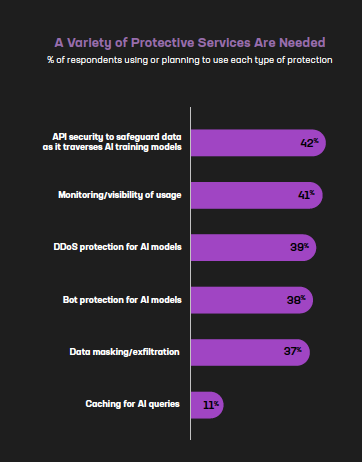F5 Survey Reveals Obstacles to AI Deployment

Enterprises have been quick to embrace artificial intelligence (AI), but they’re having trouble getting it to work.
That’s the central finding of a study from application services and security firm F5 (Nasdaq: FFIV), in which respondents to a global survey reported their progress with AI—and lack thereof.
While most enterprises are implementing generative AI (GenAI), they’re doing it haltingly and without addressing the use cases they really want. Instead, issues of data integrity and security have companies settling for chatbots and copilots that could be of minimal benefit compared to the outlay of effort they require.
Here are some numbers: 75% of F5 survey respondents said they’ve implemented GenAI, though 72% reported issues with the quality of data used in applications as well as the ability to scale AI implementations. As a result, companies aren’t yet using GenAI in live apps: A full 69% are still researching use cases, and 63% are working on proofs of concept.
What’s more, companies implementing AI aren’t getting what they need out of it. While a sprinkling of enterprises reported using GenAI for strategic purposes, 27% of respondents reported using copilots for employee productivity, while 36% use customer service chatbots. That’s far from how companies hope to use AI, including for security (64%), AIOps (61%), and managing lines of business such as marketing, finance, and AR (51%).
Data Quality Hobbles GenAI Implementation
A number of issues came to light in F5’s survey—from the cost and difficulty of getting compute resources (GPUs) to data quality. And it seems the latter is the most distressing. When asked to name the top challenges to AI adoption, 72% of respondents reported data quality and lack of ability to scale; 53% said AI skillsets were hard to come by; 42% cited the costs of building and operating AI applications; and a pitiful 27% said they did not trust the results of their AI efforts. Indeed, a full 77% reported lacking a single source of truth for their data.
“Our report highlights a concerning trend: many enterprises, in their eagerness to harness AI, overlook the need for a solid foundation,” said said Kunal Anand, EVP and CTO at F5, in a press release. “This oversight not only diminishes the effectiveness of their AI solutions but also exposes them to a multitude of security threats.”
Security Also a Factor
AI presents a range of security challenges as well. Ironically, the potential for AI-powered attacks was reported as the chief concern of AI security among 29% of enterprises in the F5 study. But the rest of their reported concerns are internal: increased corporate liability as a result of AI (reported by 27% as a top concern); data privacy (23%); and data leakage (21%).
Enterprises are pursuing a variety of solutions to deal with these challenges, including API security, DDoS protection, and bot shielding, as shown in the chart below:

Source: F5's 2024 State of AI Application Strategy Report. Used with permission
Companies also have concerns about security issues introduced by AI—data exfiltration and the revealing of personally identifiable information (PII) leading the list, followed by prompt injection attacks on AI models, biased data, exposure of data in motion, hallucinations, and exposure of data at rest.
As a result of these concerns, companies plan to spend 44% more on security over the next several years as AI implementations grow.
Spending on the Rise
Indeed, despite the concerns, enterprises seem enthusiastic enough about AI to make the effort needed for implementation. Enough successes have occurred that firms are planning to spend 18% of their IT budgets on AI this year, and 94% of respondents believe that level will increase within two years.
One executive IT leader for a distribution/services/retail company ($1-5 billion in annual revenue) expressed what many other companies hope to achieve with AI:
“[We are] implementing AI-powered recommendation systems, demand forecasting algorithms, and customer sentiment analysis to personalize offerings, optimize inventory management, and anticipate market trendsfor introducing innovative products.”
Futuriom Take: A survey report by F5 reveals that AI deployments are stalled by poor data management and quality, as well as by security concerns. But enterprises have identified these obstacles and seem willing to continue expanding their IT budgets to overcome them.















